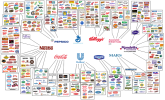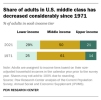When you look at the trends in income/wealth inequality in USA, you see significant change in divergence between the tip 1% and the rest of the population beginning sometime in 1992. This is when SEC first introduced requirements for disclosure of executive pay. Before that, companies could keep secret how much they pay their CxOs. Once this became public knowledge, it created a rapid race to the top, which set executive pay onto a sky-high trajectory, completely disproportionate from the rate of growth for the company itself, as well as for the US economy overall.
When each CEO's contract came up for re-negotiation, the board of directors would look at the other competitors in their industry, and how much they are paying their CEOs, determine the average value (which would almost always include some wild outlier superstar CEO with exorbitant pay package, pulling that average higher, well above the median value), and then set the pay package for their own CEO above that average. How far above? Usually at 120 - 150% above. This would be fairly logical, since no board would ever want to tell their shareholders that their CEO is below average in their industry. This would universally happen both to successful companies with growing revenues, as well as less successful ones, with declining revenues. The idea is, you reward your CEO for good performance, or to stimulate them, hoping that (s)he can turn the declining revenues around.
This is only part of the story.
There is also the governance part - Sec 162(m) from the IRS and various SEC requirements. 162(m) mandates that all compensation over $1M for any employee (not just the C-Suite) must be tied to clear, previously defined performance metrics, or it may not be deducted as a business expense by the company. Similarly, SEC governance generally requires that measures be taken to align the execs' compensation packages with shareholders' interests. In practice, this ends up driving two actions that are now standard practice in exec comp:
1) The majority of exec pay is now paid in bonus comp. If your target is, say, $2.5M for a given exec, $1.5 of it must be in performance based bonus pay, or it is not deductible.
2) The majority of exec bonus pay now consists of equity-derived packages, and most of them are deferred for some period of time.
Why? does this matter? Because the STATED income of these execs is now much higher than it was before these practices, even though the REAL income hasn't changed that much.
Let me give an example. 20 years ago, I might have gotten a bonus all paid in cash at the end of the year, and would have taken the after-tax proceeds and invested it. No big deal. Today, let's say that I was awarded a $150K bonus based on my division's performance in 2023. Instead of cash, it's all paid out as RSUs (i.e., shares of stock to be issued at a later date). Today's share price is, say $100, so I get 500 shares to be paid in each of 2024, 2025, and 2026 - $50K per year. Sound fair? Sure. In truth, it's exactly the same as what I would have gotten 20 years ago. It is not recorded as income this year, though, as I haven't yet actually received anything. Now, let's say that the share price goes up significantly. What if it goes from $100 to $200 in the first year? Well, now that $50K portion of the bonus is paid out as $100K - and that's what the SEC requires that that company report. The next year, maybe it goes up to $250/share....and now the bonus is reported as $125K. In the third year, share prices go up even more, to $350....so my bonus gets reported as $175K. In effect, because my bonus is deferred and invested in company stock, my $150K actual bonus gets reported as $400K. 20 years ago, it was reported as $150K and the earnings when I invested it were not part of the company report....but today, the W-2 earnings that are reported for me include the invested earnings on the shares that have deferred vesting.
Now, what's even more obtuse is that when execs are granted these shares, they must pay taxes on them (as regular income shown on the day that the grant vests), but generally cannot sell them for at least 6 months and often a year (depending on how the board approved the shares). So, they have to cover a 40+% tax bill on "income" that they haven't yet actually received, and cannot access.
TL/DR version: The required reports of exec income show artificially inflated numbers due to the required deferral and vesting periods, which effectively force investment income to be reported as W-2 income both in annual reports and for tax purposes.





